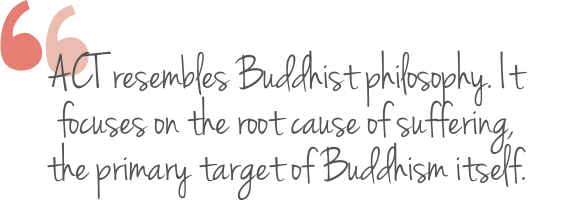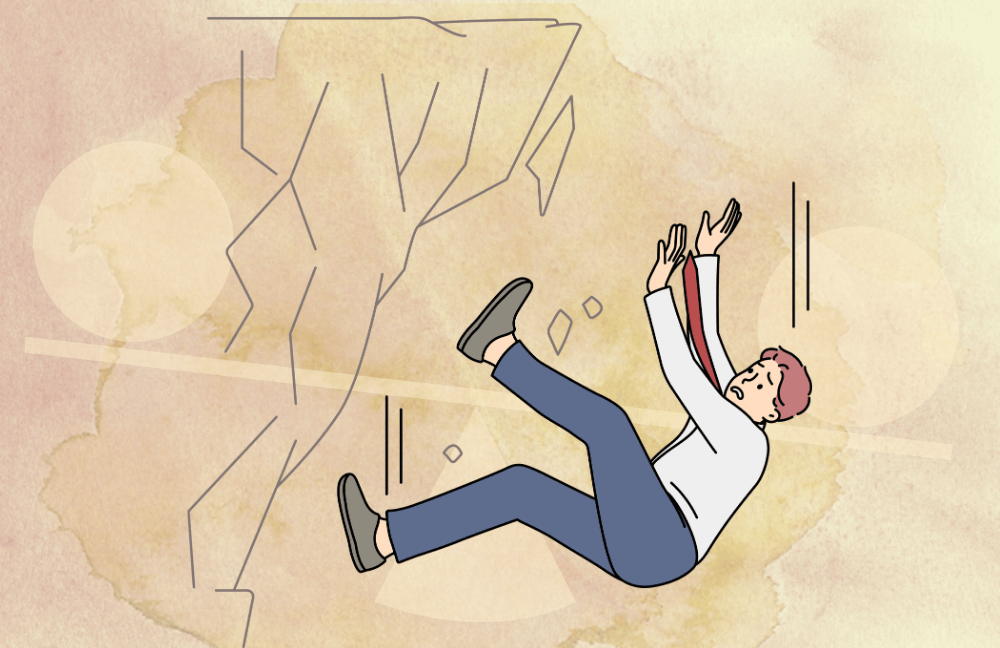Acceptance and Commitment Therapy (ACT)
What is ACT?
Acceptance and commitment therapy (ACT) is a third wave, process based Cognitive Behavior Therapy (CBT). As the name suggests, acceptance means getting out of denial, terminating the struggle against negative emotions, embracing them, and realizing that we can do something about them to make ourselves feel better. Like trees that pass you by when you drive on a forest road, negative thoughts are part of the journey, but they don’t change your destination. With that perspective, when you work with ACT, you build acceptance of all hardships and commit yourself to change, regardless of the hurdles along your way.
ACT approaches psychological problems in a dynamic context described as a ‘relational frame theory’. This essentially means that your behavior is dependent on your social, verbal, emotional and cognitive influences. So, the way you think, will define how you feel.

Fundamental Basis of ACT
Generally, physical pain is easier to comprehend than emotional anguish. In both cases though, your agony is influenced by emotions, memories, images, experiences and thoughts. If you endure rejection and tell yourself that it’s not a big deal, you don’t feel as sad. But if you react like it is the worst that can ever happen, and give up any hope for happiness after this trauma; you are likely to feel depressed. And you avoid the person, process or situation that made you feel that way, without attempting to change anything.
The choices you make at times like this define your emotional resilience. Absence of this pliability is known as ‘psychological inflexibility’ or ‘experiential avoidance’ as per ACT principles. Psychological flexibility on the other hand allows you to maintain composure in the face of the storm, and this resultant tranquility enhances the probability of using adaptive strategies to combat the stressor. Truth is, if you want to feel better, you either change the situation around you, or you change how you see the same situation. That’s the only way the pain can become less agonizing. ACT focuses on just that.
Therapeutic Principles of ACT
ACT is best offered by a trained psychotherapist. As a psychiatrist who also practices in depth therapy, Dr Shefali uses additional neurological acumen that augments therapy efficacy. ACT is not pessimism, despondency or resignation to suffering by mere acceptance. Yes, you must embrace the experiences even if they are not pleasurable. This calls for awareness and openness. The therapeutic processes of ACT include acceptance, cognitive de-fusion, flexible attention, present-focus, self-as-context, values, and committed action. These 6 factors are also known as the hexaflex model of ACT for psychological flexibility and inflexibility.
Acceptance
Cognitive De-fusion
Present-focused attention
Self-As-Context
Values
Committed action
Where is ACT used?
ACT is a specialized form of therapy that demands immense engagement and participation from the client. It makes you mindful of your own negative self-talk, and directs you to positive reflections and conversations. Typically, the cognitive model of depression, anxiety, phobia, social anxiety, and obsessive-compulsive disorder emphasizes the role of unhelpful, maladaptive and dysfunctional thinking in the causality of emotional turmoil.
ACT helps change that and pushes you towards more evolved and accomplishable emotional targets. ACT has also gained enormous applause for its benefit in physical conditions like diabetes, hypertension and chronic pain. All of these in reality are irreversible, irksome, and can be infuriating; hence adopting a more strategic tolerant approach is the only meaningful way to deal with them.
ACT Prerequisites
- Engagement and participation
- Introspection and awareness
- Willingness for self-change
- Ability to keep the focus
- Flexible thought processing
- Setting achievable goals
- Retaining self-commitment
ACT Benefits Seen In
- Anxiety Disorder Spectrum
- Specific and Social Phobia
- Obsessive Compulsive Disorder
- Depressive Disorders
- Diabetes and Hypertension
- Long Standing Pain Conditions
- Chronic illnesses in Children
ACT with Dr Shefali Batra
As a psychiatrist as well as psychotherapist practicing diverse therapies, Dr Shefali guides you through cognitive, mindfulness and neurobehavioral milestones to help you think, feel and behave differently. She facilitates “acceptance” of the current state, and helps you “commit” yourself to ACT to initiate the healing process. You become aware of your battles against anxiety, depression, obsession, frustration, anger, irritation; or simply unhappiness with your status quo.
Through therapy you are able to bring your attention to events, interactions, relationships, physical problems, or any other issues that arouse unwanted emotions in you, and then create a structured plan to change them. You learn how to reflect on what hasn’t and doesn’t work for you, and switch from an automatic mode to a more planned and process-oriented approach to life. In time you develop a mindful and responsive attitude towards yourself and others. And this reflects in a confident, optimistic and wholesome life.




References
- Ruiz, F. J., (2010). A review of Acceptance and Commitment Therapy (ACT) empirical evidence: correlational, experimental psychopathology, component and outcome studies. Int J Psychol Psychol Ther; 10:125–162.
- Hayes, S. C., Strosahl, K. D., Wilson, K. G., (1999). Acceptance and Commitment Therapy: An Experiential Approach to Behaviour Change. New York: Guilford Press.
- Hayes, S. C., Wilson, K. G., Gifford, E. V., Follette, V. M., Strosahl, K., (1996). Experiential avoidance and behavioral disorders: A functional dimensional approach to diagnosis and treatment. J Consult Clin Psychol; 64(6):1152–1168.
Latest Posts

7 Reasons Why You Should Seek Therapy

5 Time Wasters You Need to Overcome

5 Signs you have no work life balance

Work and Life: What is the right balance?


